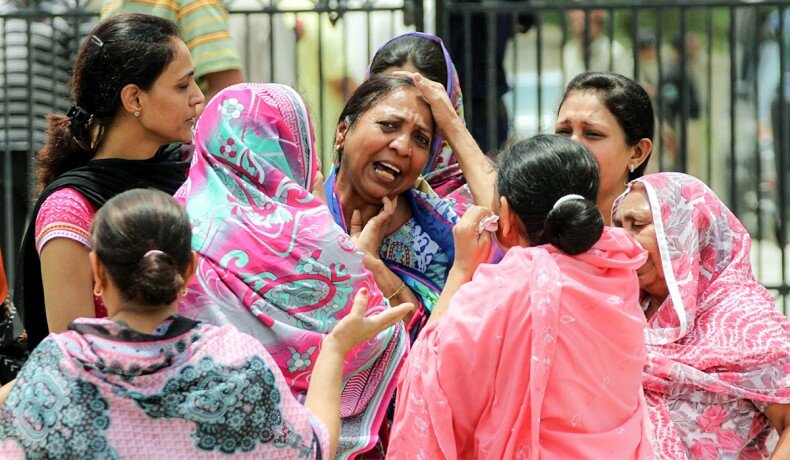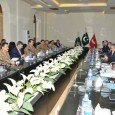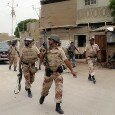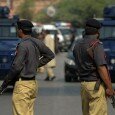By Sidrah Roghay –
A full-fledged, indiscriminate and pauseless operation against all the criminals and terrorists in Karachi and everywhere inside the country is the need of the hour
Only a day had gone by when notorious death row criminal Saulat Mirza , who was once adored by the Muttahida Qaumi Movement was hanged to death. The raid on the MQM headquarters, the absence of extortion calls and lower rates of suicide attacks, had given Karachiites the impression that ‘peace’ was almost around the corner.
 That changed on Wednesday, when a bus full of passengers from the Ismaili sect were gunned down near the dusty busy Safoora Chowrangi. As blood and gore marked television screens once again, the utility of the Karachi operation was discussed once again.
That changed on Wednesday, when a bus full of passengers from the Ismaili sect were gunned down near the dusty busy Safoora Chowrangi. As blood and gore marked television screens once again, the utility of the Karachi operation was discussed once again.
Eye witnesses claimed that six gunmen, some of which wore police uniforms followed the bus and shot down the driver. Four of them then climbed the bus and shot down each of the passengers except two, at the back of their heads.
Post-mortem reports suggest that two of the bodies were also hacked by an axe.
The half-dead conductor of the bus somehow managed to drive the vehicle to the nearest hospital. Forty-six people died, the rest are under treatment and will live to tell the horrific details.
 The gunmen left pamphlets behind, which claimed that the attacks were retaliation for the attack on Lal Masjid and an attack on a Deobandi Madressah at Rawalpindi’s Raja Bazar. Added to the list was a police officer Rao Anwar’s name whose claim to fame was a bunch of police encounters of Al-Qaeda men at Karachi’s Kemari Town.
The gunmen left pamphlets behind, which claimed that the attacks were retaliation for the attack on Lal Masjid and an attack on a Deobandi Madressah at Rawalpindi’s Raja Bazar. Added to the list was a police officer Rao Anwar’s name whose claim to fame was a bunch of police encounters of Al-Qaeda men at Karachi’s Kemari Town.
Responsibility of the attack was first claimed by the Jundullah, a splinter group of the Taliban and later by the ISIS in a statement released on Twitter. “Thanks be to Allah, 43 apostates were killed and around 30 were wounded in an attack carried out by Islamic State soldiers on a bus transporting Shiite Ismaili infidels in the city of Karachi.”
A similar pamphlet was found when Debra Lobo, an American vice-principal of a college was attacked in April this year.
 The terror spread through the Karachi bus attack is immense. Citizens especially from the minority sects feel insecure. The utility of the Karachi operation which began in September 2013 is being questioned.
The terror spread through the Karachi bus attack is immense. Citizens especially from the minority sects feel insecure. The utility of the Karachi operation which began in September 2013 is being questioned.
In the 612-day operation, at least 895 criminals and 170 law-enforcers have been killed. Over 50,000 arrests have been made, according to police reports submitted to Prime Minister Nawaz Sharif.
The results have been a general lull in crime in the city. Even reports by Human Right Commission Pakistan, a watchdog which has opposed the operation tooth and nail because of the extra judicial killing it involves, reverberate this fact. Targeted attacks have gone down by 35 percent, even though extra judicial killings have gone up by 40 percent, their report for 2014 states.
Zia Rehman, author and journalist states that the operation in Karachi has been successful in bringing down the crime ratio in the city. He rejects the commonly held perception that the operation is only targeting political parties. “The operation has targeted three main areas; political parties involved in violence, criminal syndicates and different factions of the Tehrik-e-Taliban Pakistan.”
 He maintains that it was successful in shattering the network of all three factions of the Taliban militants by killing and arresting their key leaders in the city. “If you interview Pashtun leaders they too will admit that there areas are secure after the operation,” he said.
He maintains that it was successful in shattering the network of all three factions of the Taliban militants by killing and arresting their key leaders in the city. “If you interview Pashtun leaders they too will admit that there areas are secure after the operation,” he said.
“But what the operation is not targeting,” he adds, “are sectarian outfits like the Lashkar-e-Jhangvi who are generally responsible for such attacks.”
Zohra Yousuf, chairman HRCP argues that the drop in crime rate in the city is cosmetic. “The criminals are hiding because an operation is going on. Once it ends, they will reappear and wreck havoc again.”
She criticizes the Pakistan Protection Ordinance, military courts and death sentence. “The general practice is to kill suspects in police encounters. But if all the suspects are killed how will investigation go forward,” she said.
“It is important to know who is supplying these militant outfits weapons and under whose patronage.”
 Mazhar Abbas, veteran journalist and analyst said that the bus attack could have been a retaliation to the operation in the city. “If you notice a new trend has emerged. Target attacks are less in number, but all of them are high profile, like the killing of activist Sabeen Mehmud and two professors of Karachi University. These attacks have international implications,” he said.
Mazhar Abbas, veteran journalist and analyst said that the bus attack could have been a retaliation to the operation in the city. “If you notice a new trend has emerged. Target attacks are less in number, but all of them are high profile, like the killing of activist Sabeen Mehmud and two professors of Karachi University. These attacks have international implications,” he said.
However, he said, that it was good to see the Prime Minister and Army Chief, all rush to Karachi. “This gives a signal that the leadership is serious in investigating this attack. And I am hoping that investigation will progress in the coming days.”
He favoured the Karachi operation, “despite its numerous loopholes”. “For instance there should be attention paid to the city’s numerous slum settlements which serve as hideouts for criminals, and the entry and exit points of the city should be guarded.”
“But let’s face it,” he adds, “Karachi is a big city and restoring law and order will take time.”
The writer is Karachi based journalist






























































































